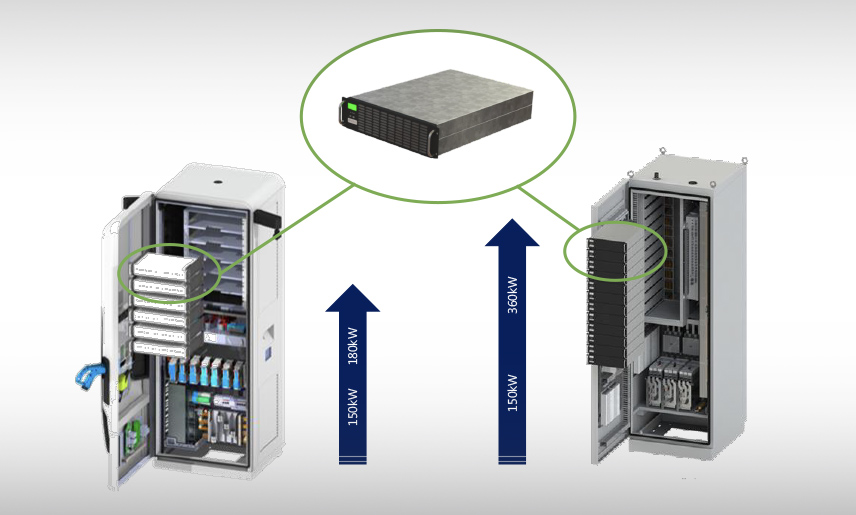
An extensive, reliable charging infrastructure is critical to the rollout of electric vehicles (EVs). Reliability begins with the manufacture of high-quality EV service equipment (EVSE). Inevitably, however, failures occasionally occur in the field. Maintaining high levels of availability requires that failures be identified and repairs completed quickly. One practical approach to returning offline EV chargers to full operability more rapidly requires extensive real-time remote monitoring. Another is a modular charger design architecture that enables faulty power components and related circuit boards to be identified and swapped out quickly. Both can be options found with the right EV charger manufacturer.
Modular EV chargers offer higher uptime
BTC POWER employs modularity in its Gen 4 line of commercial EV chargers to help maintain better than 97% availability (Figure 1), in accordance with the National Vehicle Infrastructure Standards and Requirements, a prerequisite for U.S. government funding. The company offers Gen 4 solutions with ratings from 150 to 360 kW, with all models powered by stacks of the same modular 30-kW building blocks, enabling scalability across multiple charging platforms. The modularity paves the way for the company to build even higher power versions—up to a megawatt.
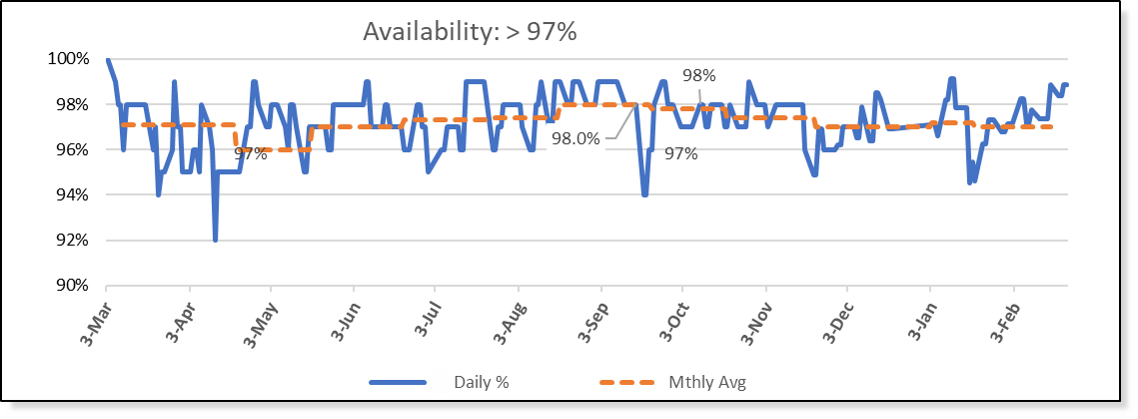
Fast power-module replacement
Modular design makes servicing much more manageable for each Gen 4 charging station. The company can offer higher power densities at lower costs per watt using 30-kW modules weighing less than 15 kg each. A single technician can change a module in less than 30 minutes without wiring changes.
Similarly, the Gen 4 control unit, which includes the electronics that operate the power modules as well as the communications and UI functions, is also modular. Contained within a dust-free housing, the control unit is held in place by four screws and can be replaced quickly and easily without disconnecting and reconnecting any wires. In contrast, maintaining other chargers generally requires wiring changes.
The Gen 4 lineup of commercial EV charging stations
The company offers two basic Gen 4 systems of commercial EV chargers—an all-in-one version and the power cabinet and public dispenser system. Both employ the same modular architecture that lets the same power modules be used across both charging platforms, both employ liquid-cooled cable options, and both are compatible with a variety of connectors, displays, and terminals.
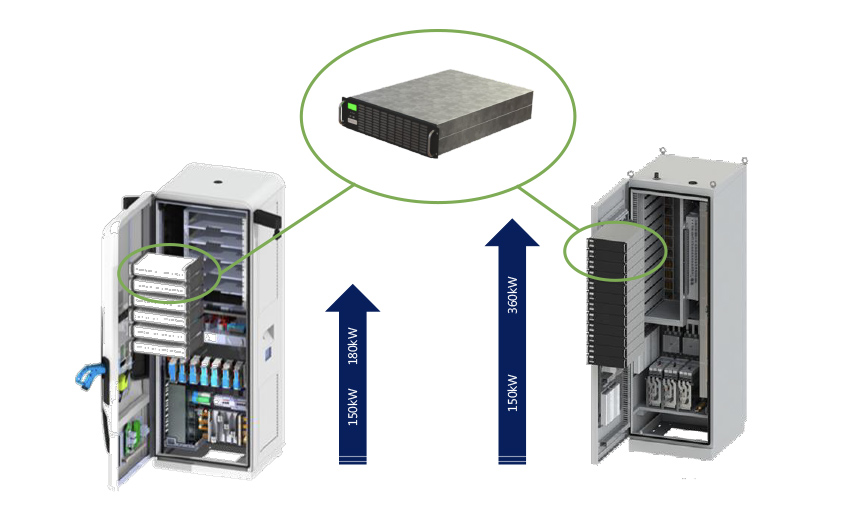
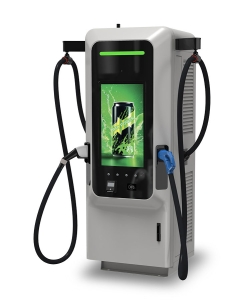 The all‑in‑one system includes the user interface with a 15-in. (32-in. optional) customizable touchscreen, communications capabilities, and power electronics. It operates up to 180 kW. With the alternative system, the satellite power cabinet, with ratings to 360 kW, is located remotely from the customer-facing public dispenser, which includes the user interface with a 15-in. touchscreen, with payment processing and communication functionality.
The all‑in‑one system includes the user interface with a 15-in. (32-in. optional) customizable touchscreen, communications capabilities, and power electronics. It operates up to 180 kW. With the alternative system, the satellite power cabinet, with ratings to 360 kW, is located remotely from the customer-facing public dispenser, which includes the user interface with a 15-in. touchscreen, with payment processing and communication functionality.
The public dispenser also includes an integrated cooling system, simplifying installation by eliminating the need to run a cooling line from a separate chiller. Both systems can interface with backends that support the Open Charge Point Protocol (OCPP). In addition, both vehicles can be charged in parallel.
High power density
A key feature of the modular Gen 4 models is their compactness, a competitive advantage that BTC POWER as a leading EV charger manufacturer can deliver due to the engineering innovation behind the Gen 4. A 360-kW Gen 4 tower is 66% smaller than a comparably rated Gen 2 version, and the Gen 4 power modules are 90% smaller than the Gen 2 power devices. Gen 4 versions also have a single front door that provides access to all major components. In contrast, the Gen 2 system had three doors, including two side doors, which imposed minimum clearance distances between adjacent towers, complicating installation and service. The result is savings in real estate that can be repurposed for more parking, boosting customers’ efficiency and profitability.
The modularity offers benefits in addition to facilitating maintenance. It enables the chargers to achieve power densities of 44 W/in.3 and efficiencies of better than 95% at nominal output power, and it enables customers to add more power capability to installed chargers as demand grows. In addition, the modular design simplifies firmware updates, which are easier to manage in the Gen 4 ecosystem—when the company rolls out a firmware update, it applies to products across the board that use the standard 30-kW modules.
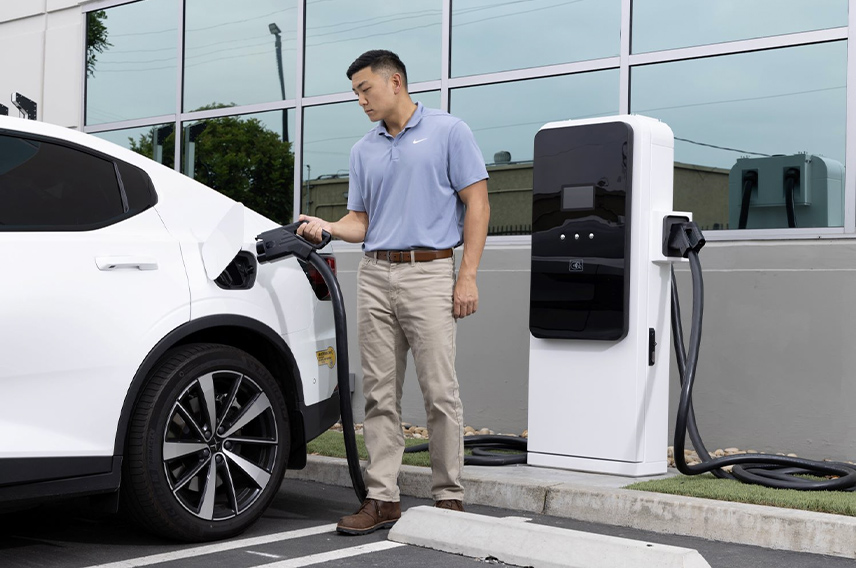
Field performance monitoring
Other key ingredients to high availability include real-time performance monitoring and the prompt dispatch of trained and certified field service technicians. BTC POWER continuously collects operational data on every charge operation to detect any failures and isolate the fault to a specific module—for example, the one faulty module out of 12 in a 360-kW system. When detecting a fault, BTC POWER can dispatch a service technician. Optionally, customers can also monitor performance data and, in the event of a fault, dispatch their own or third-party technicians trained by BTC POWER. BTC Power offers training in various ways at our facility or through remote learning programs.

Industry Survey
Are EV Chargers Paying Off?
What 200 decision-makers say about ROI, TCO and results
Modular design pays off in higher uptime and lower maintenance costs
Monitoring and field support are the culmination of an extensive quality process at BTC POWER that begins with a gated new-product-introduction (NPI) process and extends through the final production test and validation before shipment. For more on BTC POWER’s approach, see our white paper, Quality Engineering Drives EV Charging Station Uptime To 98%.
To learn more about commercial chargers from BTC POWER, the leading EV charging station manufacturer, visit the website or contact us.

